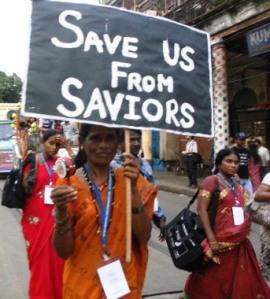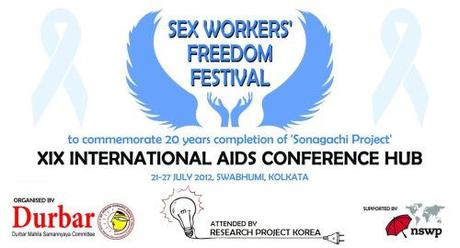A slave is one who waits for someone else to free him. - Rosellen Brown
 Asian sex worker activists are my heroes; they are everything I wish American sex worker activists could be. Here in the US, we let the media run so absolutely wild in spreading the prohibitionists’ poisonous lies that the few of us who do speak up almost seem like proof of the prohibitionist myth that we are “unrepresentative”. But when they use that same asinine strategy on Asian sex workers, it merely makes them look foolish: consider, for example, Nicholas Kristof’s claim that all 65,000 members of DMSC are “pimps”; it made him look like a clown rather than a savior, and has not exactly entered into the prohibitionist arsenal of slurs as he might have liked. Read that number again: sixty-five thousand. And Durbar is only one of many such organizations in India: SANGRAM, VAMP and others are so numerous and so influential that if it were not for the vast resources pumped into the country by American prohibitionists I have no doubt they would have achieved decriminalization long ago. Sex worker organizations in Thailand, Cambodia and South Korea are equally formidable, and like India wouldn’t suffer nearly the level of criminalization and police abuse that they do were it not for the flood of American money and busybodies pouring into them via both governmental and non-governmental channels. Yet unlike sex workers in the US, they refuse to take this abuse lying down, crawling into the shadows to cry like whipped dogs; on the contrary, they band together to fight all the harder, holding massive demonstrations and press conferences, doing their own studies to counter rescue industry mythmaking, and otherwise acting in their own defense instead of waiting for someone else to “save” them as all too many American sex workers are wont to do. It’s terribly ironic: the people whom prohibitionists characterize as most in need of “rescue” are actually those least in need of it.
Asian sex worker activists are my heroes; they are everything I wish American sex worker activists could be. Here in the US, we let the media run so absolutely wild in spreading the prohibitionists’ poisonous lies that the few of us who do speak up almost seem like proof of the prohibitionist myth that we are “unrepresentative”. But when they use that same asinine strategy on Asian sex workers, it merely makes them look foolish: consider, for example, Nicholas Kristof’s claim that all 65,000 members of DMSC are “pimps”; it made him look like a clown rather than a savior, and has not exactly entered into the prohibitionist arsenal of slurs as he might have liked. Read that number again: sixty-five thousand. And Durbar is only one of many such organizations in India: SANGRAM, VAMP and others are so numerous and so influential that if it were not for the vast resources pumped into the country by American prohibitionists I have no doubt they would have achieved decriminalization long ago. Sex worker organizations in Thailand, Cambodia and South Korea are equally formidable, and like India wouldn’t suffer nearly the level of criminalization and police abuse that they do were it not for the flood of American money and busybodies pouring into them via both governmental and non-governmental channels. Yet unlike sex workers in the US, they refuse to take this abuse lying down, crawling into the shadows to cry like whipped dogs; on the contrary, they band together to fight all the harder, holding massive demonstrations and press conferences, doing their own studies to counter rescue industry mythmaking, and otherwise acting in their own defense instead of waiting for someone else to “save” them as all too many American sex workers are wont to do. It’s terribly ironic: the people whom prohibitionists characterize as most in need of “rescue” are actually those least in need of it.
That’s why I am glad to see today, Sex Worker Rights Day, finally beginning to gain the attention it deserves; you see, it is the only one of the “big three” sex worker observances with an Asian origin:
[Sex Worker Rights Day]…originated in India in 2001 as a festival organized by the sex worker rights organization Durbar Mahila Samanwaya Committee, and attended by 25,000 sex workers despite efforts from prohibitionist groups who tried to prevent it by pressuring the government to revoke their permit. In celebration of their victory over those who wish to criminalize and marginalize sex workers, DMSC proposed it as an annual, international event the following year: “We felt strongly that that we should have a day what need to be observed by the sex workers community globally…Knowing the usual response of international bodies and views of academicians and intellectuals of the 1st world (many of them consider that sex workers of third world are different from 1st world and can’t take their decision) a call coming from a third world country would be more appropriate at this juncture, we believe. It will be a great pleasure to us if all of you observe the day in your own countries too…”
Though the day caught on fairly rapidly in Asia and Africa, it was still virtually unrecognized in Europe and North America in 2008, and only barely recognized the first time I wrote about it in 2011. But it’s quickly gained ground since then; by 2012 a number of Westerners were writing about it online, and last year it seemed to get even more attention than Whores’ Day. As I wrote in my column for the latter occasion, “The sex worker rights movement was born in the West, but it has come of age in the East and South, and it is their example which is most heartening to those of us struggling under the near-constant persecution of our profession in the United States.” While it’s true that the movement in Australia and New Zealand has succeeded in winning the best conditions for sex workers, those activists didn’t have to contend with the racism, colonialism and blatant interventionism against which Asian sex workers must struggle for every tiny gain; furthermore, they’ve succeeded in moving forward while Europe has been trapped in a dramatic backslide. That’s why I’m proud to hold them up as an inspiration for Western activists, and to do my small part in promoting a celebration which they created. 
